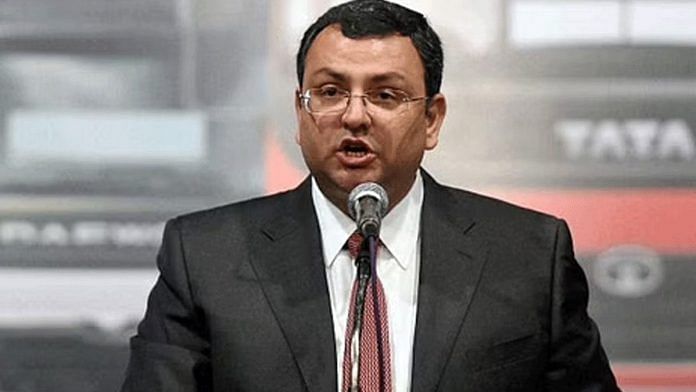Mumbai: Former Tata Group chairman Cyrus Mistry, who had an acrimonious fallout with the top multinational conglomerate, died Sunday afternoon after his car hit a divider on the Mumbai-Ahmedabad highway near Palghar, about 130 km from Mumbai.
Mistry, 54, is survived by his wife Rohiqa and their two sons.
The accident occurred at Charoti in Palghar around 3:15 pm when Mistry was returning to Mumbai from Ahmedabad. “The accident took place on a bridge over the Surya river. Four people were present in the car. Two died on spot and two were taken to a hospital,” PTI quoted a police official as saying.
The bodies of Mistry and Jehangir Pandole would be taken to JJ hospital in Mumbai by road for post mortem and will be escorted by a team of Maharashtra Police, Palghar collector Govind Bodke told ThePrint, adding that the injured were airlifted to Breach Candy hospital in Mumbai.
As the news of the accident spread, politicians and industrialists tweeted their condolences. Prime Minister Narendra Modi paid tribute to Mistry, saying the demise was a big loss to the world of commerce and industry.
Also Read: Tata considers leadership makeover of its 153-year-old empire, could create CEO role
Soft-spoken leader
Like former Tata Group chairman Ratan Tata, Mistry was fond of cars, especially sport utility vehicles. An avid reader, Mistry was also a foodie and loved his vacations in Europe. He loved golf apart from cars. In the business circles, he was known to be quiet, soft spoken and someone who steered away from the party circuit.
Born on July 4, 1968, Mistry did his graduation in civil engineering from London’s Imperial College of Science, Technology and Medicine. This was followed up with a Masters in Management from the London Business School.
He was the younger son of Shapoorji Pallonji Group chairman Pallonji Mistry. In 1991, Mistry entered the family business, becoming director of the conglomerate with interests in engineering and construction, infrastructure, real estate, water, energy and financial services.
Pallonji Mistry was on the board of the Tata Group, in which the family was the single largest shareholder of Tata Sons with 18.47 per cent stake. Mistry was 38 when he succeeded Pallonji when his father retired from the board of Tata Sons in 2006.
In 2011, Cyrus was made deputy chairman of the Tata Group, with the goal of taking over as chairman one year later, upon the retirement of Ratan Tata, who had headed the group since 1991.
The turning point in his career was when he became Tata Sons’ chairman in 2012, succeeding Ratan Tata. He was the first non-Tata to head the Tata Group and the sixth chairman of Tata Group. But his tenure was short and abruptly ended in 2016 when he was ousted from the position in October 2016. N Chandrasekaran later took over as executive chairman of Tata Sons.
The exit from the Tata group was acrimonious. He refused to step down from the boards and instead chose the legal route. “They mistook Cyrus’ quiet confidence and inner strength as his weakness. They probably never thought what would happen the day after they fired him,” Nirmalya Kumar, who was part of the core group executive council formed by Mistry till he was fired, told Mint in an interview.
In a hard-hitting letter, Mistry wrote that he was assured free hand prior to his appointment. “Ratan Tata was to step back and only give advice when needed. After my appointment though, rules were modified by the Tatas. Inappropriate intervention was done by Ratan Tata that constrained the ability to turnaround. I was pushed to becoming a lameduck chairman,” he wrote to the directors of Tata Sons.
Mistry was hard even on Tata Nano, the pet project of Ratan Tata, saying that there was no line of profitability for Nano. Emotional reasons kept the project from shutting down, he claimed.
What followed his ouster was a long-drawn legal battle. In December 2016, N. Chandrasekaran was appointed as the Tata Sons chairman. In February 2017, Mistry was removed from the board of Tata Sons.
Two months later, he moved the National Company Law Appellate Tribunal (NCLAT). In December 2019, NCLAT restored Mistry as executive chairman of Tata Group and called the appointment of Chandrasekaran as illegal.
Tata Sons challenged the NCLAT decision in the Supreme Court. The top court in January 2020, stayed the NCLAT decision. In December that year, the SC began the final hearing and later set aside the NCLAT decision in March 2021.
(Edited by Tony Rai)
Also Read: From Lakshmi to Lakmé — story of India’s first cosmetic brand, envisioned by PM Nehru



